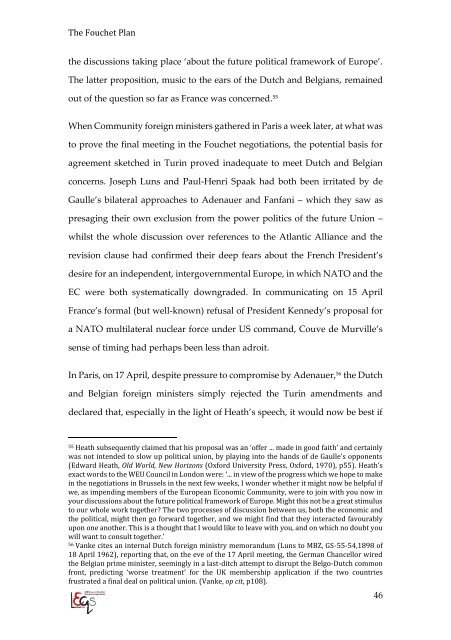The Fouchet Plan De Gaulle’s Intergovernmental Design for Europe
n?u=RePEc:eiq:eileqs:117&r=cdm
n?u=RePEc:eiq:eileqs:117&r=cdm
You also want an ePaper? Increase the reach of your titles
YUMPU automatically turns print PDFs into web optimized ePapers that Google loves.
<strong>The</strong> <strong>Fouchet</strong> <strong>Plan</strong><br />
the discussions taking place ‘about the future political framework of <strong>Europe</strong>’.<br />
<strong>The</strong> latter proposition, music to the ears of the Dutch and Belgians, remained<br />
out of the question so far as France was concerned. 55<br />
When Community <strong>for</strong>eign ministers gathered in Paris a week later, at what was<br />
to prove the final meeting in the <strong>Fouchet</strong> negotiations, the potential basis <strong>for</strong><br />
agreement sketched in Turin proved inadequate to meet Dutch and Belgian<br />
concerns. Joseph Luns and Paul-Henri Spaak had both been irritated by de<br />
<strong>Gaulle’s</strong> bilateral approaches to Adenauer and Fanfani – which they saw as<br />
presaging their own exclusion from the power politics of the future Union –<br />
whilst the whole discussion over references to the Atlantic Alliance and the<br />
revision clause had confirmed their deep fears about the French President’s<br />
desire <strong>for</strong> an independent, intergovernmental <strong>Europe</strong>, in which NATO and the<br />
EC were both systematically downgraded. In communicating on 15 April<br />
France’s <strong>for</strong>mal (but well-known) refusal of President Kennedy’s proposal <strong>for</strong><br />
a NATO multilateral nuclear <strong>for</strong>ce under US command, Couve de Murville’s<br />
sense of timing had perhaps been less than adroit.<br />
In Paris, on 17 April, despite pressure to compromise by Adenauer, 56 the Dutch<br />
and Belgian <strong>for</strong>eign ministers simply rejected the Turin amendments and<br />
declared that, especially in the light of Heath’s speech, it would now be best if<br />
55 Heath subsequently claimed that his proposal was an ‘offer ... made in good faith’ and certainly<br />
was not intended to slow up political union, by playing into the hands of de <strong>Gaulle’s</strong> opponents<br />
(Edward Heath, Old World, New Horizons (Ox<strong>for</strong>d University Press, Ox<strong>for</strong>d, 1970), p55). Heath’s<br />
exact words to the WEU Council in London were: ‘... in view of the progress which we hope to make<br />
in the negotiations in Brussels in the next few weeks, I wonder whether it might now be helpful if<br />
we, as impending members of the <strong>Europe</strong>an Economic Community, were to join with you now in<br />
your discussions about the future political framework of <strong>Europe</strong>. Might this not be a great stimulus<br />
to our whole work together? <strong>The</strong> two processes of discussion between us, both the economic and<br />
the political, might then go <strong>for</strong>ward together, and we might find that they interacted favourably<br />
upon one another. This is a thought that I would like to leave with you, and on which no doubt you<br />
will want to consult together.’<br />
56 Vanke cites an internal Dutch <strong>for</strong>eign ministry memorandum (Luns to MBZ, GS-55-54,1898 of<br />
18 April 1962), reporting that, on the eve of the 17 April meeting, the German Chancellor wired<br />
the Belgian prime minister, seemingly in a last-ditch attempt to disrupt the Belgo-Dutch common<br />
front, predicting ‘worse treatment’ <strong>for</strong> the UK membership application if the two countries<br />
frustrated a final deal on political union. (Vanke, op cit, p108).<br />
46


